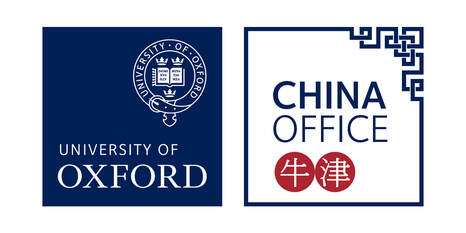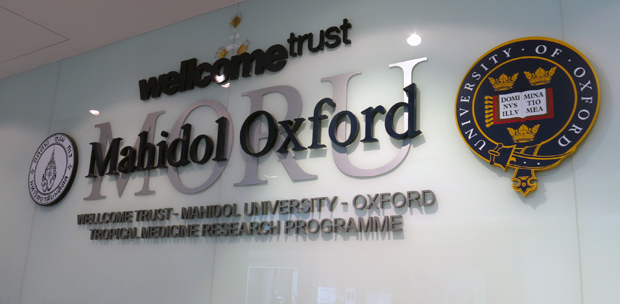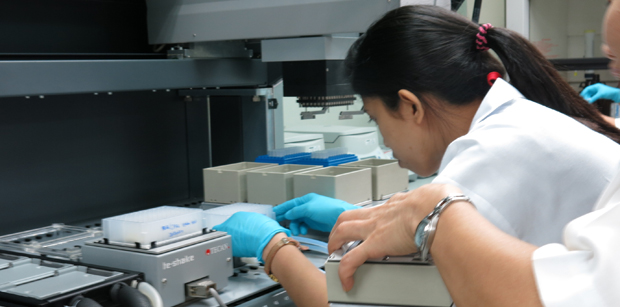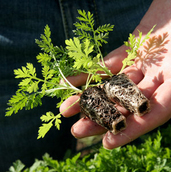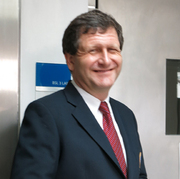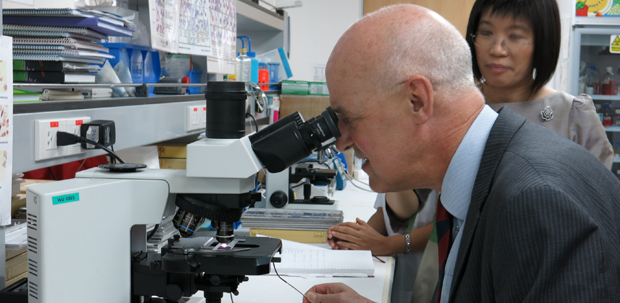Spotlight on Oxford
Oxford In China > Spotlight > Oxford Asia Tropical Medicine Research Network
SPOTLIGHT
TROPIC RESISTANCE
The Oxford Asia Tropical Medicine Research Network has been conducting life-saving research into infectious diseases in Asia since 1979.
TROPIC RESISTANCE
The Oxford Asia Tropical Medicine Research Network has been conducting life-saving research into infectious diseases in Asia since 1979.
Malaria,
dengue fever, scrub typhoid, melioidosis, SARS, H7N9 – diseases which has
affected millions around the globe. What you might not know is that an Oxford
tropical medical science network in southeast Asia has for over 30 years been tackling
these healthcare challenges.
The Mahidol University Oxford Tropical Medicine Research Unit, or MORU, is one of the most enduring research facilities run by any universities overseas. Established in 1979, it is collaboration between Mahidol University in Bangkok, the University of Oxford and the Wellcome Trust, one of the world’s largest charities supporting biomedical research. MORU employs over 600 staff, with a central hub in the Mahidol University in Bangkok, and a network of clinical research sites and laboratories across Thailand in countries including Laos, Cambodia, Myanmar, Bangladesh, India, Nigeria, Kenya, Mozambique and DR Congo. Its sister unit, the Oxford University Clinical Research Unit, or OUCRU, has a central hub in Ho Chi Minh City set up in 1991 and now employs over 200 researchers which support public-health efforts in Vietnam, Nepal and Indonesia. The two hubs are strategically located, with roughly half the world’s population within 2,000 miles of both. Together they form the Oxford Asia Tropical Medicine Research Network.
At the frontline of tropical health
MORU’s work is centered on fighting infectious tropical diseases affecting rural communities in Asia and elsewhere in the developing world. These include malaria as well as bacterial infections like melioidosis, which very few people know about but which affects huge numbers of the population in Thailand elsewhere in SE Asia, India, China and Brazil. In fact, the current recommendations for the prevention and treatment of almost every major tropical illness are based on work conducted by MORU. The center is also active in identifying counterfeit medicines and publicizing ways that they can be recognized, as well as developing the skills and capacity of medical professionals in the world.
The Mahidol University Oxford Tropical Medicine Research Unit, or MORU, is one of the most enduring research facilities run by any universities overseas. Established in 1979, it is collaboration between Mahidol University in Bangkok, the University of Oxford and the Wellcome Trust, one of the world’s largest charities supporting biomedical research. MORU employs over 600 staff, with a central hub in the Mahidol University in Bangkok, and a network of clinical research sites and laboratories across Thailand in countries including Laos, Cambodia, Myanmar, Bangladesh, India, Nigeria, Kenya, Mozambique and DR Congo. Its sister unit, the Oxford University Clinical Research Unit, or OUCRU, has a central hub in Ho Chi Minh City set up in 1991 and now employs over 200 researchers which support public-health efforts in Vietnam, Nepal and Indonesia. The two hubs are strategically located, with roughly half the world’s population within 2,000 miles of both. Together they form the Oxford Asia Tropical Medicine Research Network.
At the frontline of tropical health
MORU’s work is centered on fighting infectious tropical diseases affecting rural communities in Asia and elsewhere in the developing world. These include malaria as well as bacterial infections like melioidosis, which very few people know about but which affects huge numbers of the population in Thailand elsewhere in SE Asia, India, China and Brazil. In fact, the current recommendations for the prevention and treatment of almost every major tropical illness are based on work conducted by MORU. The center is also active in identifying counterfeit medicines and publicizing ways that they can be recognized, as well as developing the skills and capacity of medical professionals in the world.
Similarly in Vietnam, OUCRU’s clinical and scientific research programme focuses on the most significant infectious diseases. Prof. Jeremy Farrar, Director of the OUCRU until October this year when he will become Director of the Wellcome Trust, has spent the past 17 years on the frontline of the battle with infectious diseases, from dengue and typhoid to severe acute respiratory syndrome (SARS) and H7N9 avian influenza.
A core focus of the Oxford Asia Tropical Medicine Network has been understanding and developing treatments for malaria. Malaria may seem like a remote disease, but very year 220 million new cases are diagnosed and over 600,000 deaths occur around the world because of it. The work of MORU has formed the basis of treatment of malaria as embodied in the 2006 and 2010 WHO Guidelines. The network has recently completed the largest ever trials in severe malaria and the results show that the current best anti-malarial drug, Artesunate (an Artemisinin derivative) reduces the death rate of malaria by 35% in adults in SE Asia, and by 23% in children in Africa. As Professor Nick White, chairman of the network says, ‘if just half the children with severe malaria in the world could access these drugs, we could save 100,000 lives a year’.
A core focus of the Oxford Asia Tropical Medicine Network has been understanding and developing treatments for malaria. Malaria may seem like a remote disease, but very year 220 million new cases are diagnosed and over 600,000 deaths occur around the world because of it. The work of MORU has formed the basis of treatment of malaria as embodied in the 2006 and 2010 WHO Guidelines. The network has recently completed the largest ever trials in severe malaria and the results show that the current best anti-malarial drug, Artesunate (an Artemisinin derivative) reduces the death rate of malaria by 35% in adults in SE Asia, and by 23% in children in Africa. As Professor Nick White, chairman of the network says, ‘if just half the children with severe malaria in the world could access these drugs, we could save 100,000 lives a year’.
|
The fight against malaria and artemisinin – a traditional Chinese drug
What is artemisinin? A chemical compound extracted from the tips of a sweet Chinese wormwood called Artemisia Annua, it had been used in China for decades. Prof. Nick White first read about it in a Chinese medical journal in the 1980s, but it took international health authorities many years to recognize the drug. Meanwhile, a group of researchers, including Prof. White’s team at MORU, pioneered key studies into the drug in the 1990s and produced solid data to prove its usefulness in fighting malaria. The results eventually persuaded WHO to issue revised guidelines that recommended the use of artemisinin-based combination therapy (ACT) as a first-line treatment for malaria everywhere – the most important breakthrough in public health in the past 50 years. |
But one challenge yields another. The major problem now facing the world is the discovery of arteminisin resistance in Cambodia and the Thai/Cambodia border, with no molecular marker of resistance identified. If malaria parasites resistant to best anti-malarial drug in the world spread from SE Asia to across Africa, where 90% of malaria deaths occur, there will be a public health disaster. Tackling arteminim resistance will be the priority of the network in the coming years. To that end, in 2012, MORU published the results of a large study showing the emergence and cause of artemisinin resistance over the last 10 years.
Bench to bedside, and beyond
The work of the Oxford Asia Tropical Medicine network in tackling neglected tropical diseases have led to the development of strong and lasting collaborations with governments, hospitals, doctors, researchers and other academic colleagues across the globe. The outstanding success of these collaborations have already directly influenced WHO policies as well as national recommended treatments for many tropical diseases. The strong links Oxford have built with Ministries of Health in Asia as well as Africa mean that research results feed directly into public health policies across these continents.
The Oxford network is also coordinating a dedicated effort to improve intensive care medicine in developing countries in Asia, through supporting the education and professional development of local health staff, which is key to successfully managing and eliminating dangerous infections. For example, MORU has run ICU training programmes in India, Bangladesh and Nepal which aims to implement the best care of patients with severe malaria and other severe illnesses. This type of collaboration with local health staff and interaction with patients also allows Oxford faculty members to conduct research from bench to bedside, identifying the important research questions and improving the quality of their research.
Better understanding and communication of health and science issues in local communities is also something that the Oxford network is tackling. Promote public awareness of tropical diseases is key in the battle against tropical diseases. For example, in May 2012 MORU developed a campaign to promote awareness of melioidosis to support the advice of Ministry of Public Health in Thailand, which included a video clip contest entitled “Melioidosis, an infectious disease that Thais must know” . OUCRU’s public engagement team, whose activities are also directly supported by the Wellcome Trust, engages the media and the local community by bringing science to the forefront of people’s minds through workshops, science cafés and science theatre productions.
Patient-led blue sky thinking
Tackling infectious diseases, which is a major cause of death, sickness and economic hardship for millions of people in the world, is one of the greatest challenges of the 21st century, and in the coming years, the Oxford Asia Tropical Medicine Network will continue to research solutions to the increasingly urgent problems these diseases cause, including developing front-line treatments and committing to a unparalleled public engagement with the diseases.
Bench to bedside, and beyond
The work of the Oxford Asia Tropical Medicine network in tackling neglected tropical diseases have led to the development of strong and lasting collaborations with governments, hospitals, doctors, researchers and other academic colleagues across the globe. The outstanding success of these collaborations have already directly influenced WHO policies as well as national recommended treatments for many tropical diseases. The strong links Oxford have built with Ministries of Health in Asia as well as Africa mean that research results feed directly into public health policies across these continents.
The Oxford network is also coordinating a dedicated effort to improve intensive care medicine in developing countries in Asia, through supporting the education and professional development of local health staff, which is key to successfully managing and eliminating dangerous infections. For example, MORU has run ICU training programmes in India, Bangladesh and Nepal which aims to implement the best care of patients with severe malaria and other severe illnesses. This type of collaboration with local health staff and interaction with patients also allows Oxford faculty members to conduct research from bench to bedside, identifying the important research questions and improving the quality of their research.
Better understanding and communication of health and science issues in local communities is also something that the Oxford network is tackling. Promote public awareness of tropical diseases is key in the battle against tropical diseases. For example, in May 2012 MORU developed a campaign to promote awareness of melioidosis to support the advice of Ministry of Public Health in Thailand, which included a video clip contest entitled “Melioidosis, an infectious disease that Thais must know” . OUCRU’s public engagement team, whose activities are also directly supported by the Wellcome Trust, engages the media and the local community by bringing science to the forefront of people’s minds through workshops, science cafés and science theatre productions.
Patient-led blue sky thinking
Tackling infectious diseases, which is a major cause of death, sickness and economic hardship for millions of people in the world, is one of the greatest challenges of the 21st century, and in the coming years, the Oxford Asia Tropical Medicine Network will continue to research solutions to the increasingly urgent problems these diseases cause, including developing front-line treatments and committing to a unparalleled public engagement with the diseases.
|
“The vision of MORU is to improve the lot of the rural poor population of southeast Asia and beyond,’ says Prof. Nick Day, Director of MORU, ‘and there are also spinoff benefits for Africa with the anti-malarial programme. All the research that we do has to have as its ultimate end point a direct impact on health.’ One of Oxford’s major challenges on working in tropical medicine is to make sure that the research is internationally relevant, but that research also has to be translated into effective patient care, which is why it is important for Oxford to continue to work close to the diseases in Asia.
|
The work of both MORU and OUCRU is supported by the Wellcome Trust, which has provided £21.6 million of funding since 2005, including £3 million of core funding every year. MORU and OUCRU also receive funding from governments as well as a number of philanthropic organisations, including the Gates Foundation and the Li Ka Shing Foundation. The work that these organisations has supported has already affected a huge swathe of the planet, but the problems of artemisinin resistance, the scourge of fake and substandard drugs and the possibility of a worldwide human influenza pandemic continue to pose serious risks to the world. The Oxford Asia Tropical Medicine Network is strongly placed to address these problems effectively and make a significant impact on human health in the region and beyond.
“There are moments in history where we can make a real difference and I think we are in one of those moments now’, said Prof. Farrar. ‘We have never had the ability technologically and scientifically to do some of thing we are doing now, and as long as we marry this with an inquisitive mind, as well as support politically and through philanthropic agencies - that coming together of different partners gives us a unique opportunity to make a real difference, and that’s why I feel so positive about the future.”
“There are moments in history where we can make a real difference and I think we are in one of those moments now’, said Prof. Farrar. ‘We have never had the ability technologically and scientifically to do some of thing we are doing now, and as long as we marry this with an inquisitive mind, as well as support politically and through philanthropic agencies - that coming together of different partners gives us a unique opportunity to make a real difference, and that’s why I feel so positive about the future.”
